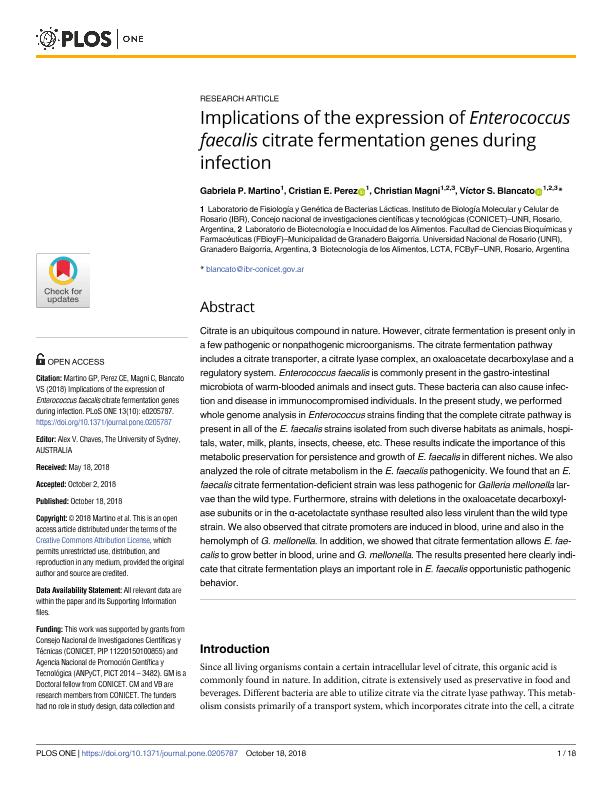Artículo
Implications of the expression of Enterococcus faecalis citrate fermentation genes during infection
Martino, Gabriela Paula ; Perez Dezen, Cristian Emanuel; Magni, Christian
; Perez Dezen, Cristian Emanuel; Magni, Christian ; Blancato, Victor Sebastian
; Blancato, Victor Sebastian
 ; Perez Dezen, Cristian Emanuel; Magni, Christian
; Perez Dezen, Cristian Emanuel; Magni, Christian ; Blancato, Victor Sebastian
; Blancato, Victor Sebastian
Fecha de publicación:
10/2018
Editorial:
Public Library of Science
Revista:
Plos One
ISSN:
1932-6203
Idioma:
Inglés
Tipo de recurso:
Artículo publicado
Clasificación temática:
Resumen
Citrate is an ubiquitous compound in nature. However, citrate fermentation is present only in a few pathogenic or nonpathogenic microorganisms. The citrate fermentation pathway includes a citrate transporter, a citrate lyase complex, an oxaloacetate decarboxylase and a regulatory system. Enterococcus faecalis is commonly present in the gastro-intestinal microbiota of warm-blooded animals and insect guts. These bacteria can also cause infection and disease in immunocompromised individuals. In the present study, we performed whole genome analysis in Enterococcus strains finding that the complete citrate pathway is present in all of the E. faecalis strains isolated from such diverse habitats as animals, hospitals, water, milk, plants, insects, cheese, etc. These results indicate the importance of this metabolic preservation for persistence and growth of E. faecalis in different niches. We also analyzed the role of citrate metabolism in the E. faecalis pathogenicity. We found that an E. faecalis citrate fermentation-deficient strain was less pathogenic for Galleria mellonella larvae than the wild type. Furthermore, strains with deletions in the oxaloacetate decarboxylase subunits or in the ∞-acetolactate synthase resulted also less virulent than the wild type strain. We also observed that citrate promoters are induced in blood, urine and also in the hemolymph of G. mellonella. In addition, we showed that citrate fermentation allows E. faecalis to grow better in blood, urine and G. mellonella. The results presented here clearly indicate that citrate fermentation plays an important role in E. faecalis opportunistic pathogenic behavior.
Archivos asociados
Licencia
Identificadores
Colecciones
Articulos(IBR)
Articulos de INST.DE BIOLOGIA MOLECULAR Y CELULAR DE ROSARIO
Articulos de INST.DE BIOLOGIA MOLECULAR Y CELULAR DE ROSARIO
Citación
Martino, Gabriela Paula; Perez Dezen, Cristian Emanuel; Magni, Christian; Blancato, Victor Sebastian; Implications of the expression of Enterococcus faecalis citrate fermentation genes during infection; Public Library of Science; Plos One; 13; 10; 10-2018; 1-18; e0205787
Compartir
Altmétricas



